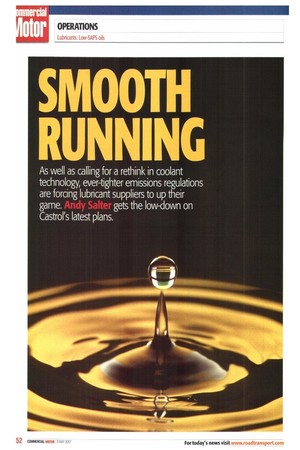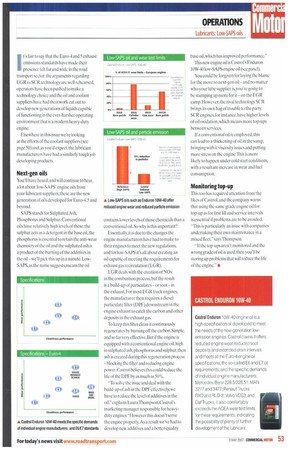SMOOTH
Page 52

Page 53

If you've noticed an error in this article please click here to report it so we can fix it.
RUNNING
As well as calling for a rethink in coolant technology, ever-tighter emissions regulations are forcing lubricant suppliers to up their
game. 7.11%.41 gets the low-down on
Castrol's latest plans.
It's fair to say that the Euro-4 and 5 exhaust emissions standards have made their presence felt far and wide in the road transport sector: the arguments regarding EGR vs SCR technology are well rehearsed, operators have been pushed to make a technology choice and the oil and coolant suppliers have had their work cut out to develop new generations of liquids capable of functioning in the ever-harsher operating environment that is a modem heavy-duty engine.
Elsewhere in this issue we're looking at the efforts of the coolant suppliers (see page 50) and, as you'd expect, the lubricant manufacturers have had a similarly tough job developing products.
Next-gen oils
You'll have heard, and will continue to hear, a lot about `low-S APS' engine oils from your lubricant suppliers; these are the new generation of oils developed for E,uro-4,5 and beyond.
SAPS stands for Sulphated Ash, Phosphorus and Sulphur. Conventional oils have relatively high levels of these: the sulphur acts as a detergent in the base oil, the phosphorus is essential to retain the anti-wear chemistry of the oil and the sulphated ash is a product of the burning of the additives in the oil —we'll pick this up in a minute. LowSAPS, as the name suggests. means the oil contains lower levels of those chemicals than a conventional oil.So why is this important?
Essentially, it is due to the changes the engine manufacturers have had to make to their engines to meet the new regulations, and for low-SAPS it's all about creating an oil capable of meeting the requirements for exhaust gas recirculation (EGR).
EGR deals with the creation of NOx in the combustion process, but the result is a build-up of particulates— or soot — in the exhaust. For most EGR truck engines, the manufacturer then requires a diesel particulate filter (DPF) downstream in the engine exhaust to catch the carbon and other deposits in the exhaust gas.
To keep this filter clean it continuously regenerates by burning off the carbon. Simple, and so far very effective. But if the engine is equipped with a conventional engine oil, high in sulphated ash, phosphorus and sulphur, then ash is created during this regeneration process. — blocking the filter and reducing engine power. Castrol believes this could reduce the life of the DPF by as much as 50%.
"To solve the issue and deal with the build-up of ash in the DPF effectively, we have to reduce the level of additives in the oil," explains Laura Thompson, Castrol's marketing manager responsible for heavyduty engines. "However this doesn't serve the engine properly. As a result we've had to develop new additives and a better-quality base oil, which has improved performance."
'This new engine oil is Castrol's Enduron 10W-40 low-SAPS engine oil (see panel).
You could be forgiven for laying the blame for the move to next-gen oil — and no matter who your lube supplier is, you're going to be stumping up more for it—on the EGR camp. However, the rival technology SCR brings its own bag of trouble to the party. SCR engines, for instance, have higher levels of oil oxidation, which means more top-ups between services.
If a conventional oil is employed, this can lead to a thickening of oil in the sump, bringing with it viscosity issues and putting more stress on the engine.This is more likely to happen under cold start conditions, with a resultant increase in wear and fuel consumption.
Monitoring top-up
This too has required attention from the likes of Castro], and the company warns that using the same grade engine oil for top-up as for first fill and service intervals is essential if problems are to be avoided. This is particularly an issue with companies undertaking their own maintenance in a mixed fleet," says Thompson.
'lithe top-ups aren't monitored and the wrong grade of oil is used, then you'll he storing up problems that will reduce the life of the engine." •


























































































































































































